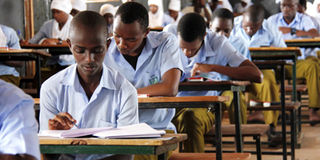Reduce teaching subjects to 10, World Bank tells Uganda govt

Pressed? Students sit Uganda Certificate of Education examinations last year. PHOTO BY ABUBAKER LUBOWA
What you need to know:
Reason. World Bank says reduction of subjects will ensure easy management of the institution and efficiency in service delivery
The World Bank has urged government to reduce the proposed 15 subjects under the revised lower secondary curriculum to 10 in order to achieve efficiency.
Mr Mourad Ezzine, the World Bank adviser on global education practice, said there is need to roll out the new O-Level curriculum urgently but warned that teaching more than 10 subjects will not encourage skills development which the new approach should address.
“We need to roll out the new curriculum. I can’t insist enough that a heavy curriculum doesn’t respond to modern pedagogy. In the modern world in which we are living, we need to have a citizen with problem solving skills. By slicing the curriculum in so many subjects we can’t develop these problem solving skills effectively,” Mr Ezzine said while presenting findings of a research report at Makerere University last week.
He added: “We recommend that more than 10 subjects is a problem for learning and teaching and managing schools. How can you manage a school with so many subjects? How can you manage a system with so many specialised teachers in every subject?”
The recent curriculum
In the revised curriculum, National Curriculum Development Centre (NCDC) has reduced the earlier-taught 40 subjects at O-Level to 20. However, the curriculum developers who declined to be named, said the matter is sensitive, and schools will be allowed to choose up to 15 subjects.
“World Bank advised and their proposal for eight learning areas was rejected in 2016. We went back to the drawing board and stakeholders have agreed to these subjects. They are the consumers.
“We are working hard to see that we really take off next year. If people have rejected what you have given them as World Bank, why do you want to continue forcing yourself? Other countries have more than 10 subjects on the menu and they are doing well,” the source at NCDC said.
The World Bank report noted that while the introduction of the new curriculum will represent significant progress compared to the existing one, the approach adopted by most schools to offer up to 15 subjects needs to be revised.
“Small one-stream schools should not offer more than three elective subjects in addition to the seven compulsory core subjects. The elective subjects are to be selected by the school to enable them to specialise in specific profiles for example sciences and humanities while achieving more efficiency,” the World Bank report reads in part.
The report adds that the official teaching load should be clearly stated and consistently adhered to in all schools to enable school managers to redistribute work more efficiently to the teachers who have less than the minimum expected load.
In addition, they want the official teaching load to match the regional standard of 20 hours per week.
Government responds
However, Mr Aggrey Kibenge, the Ministry of Education undersecretary, yesterday said while they received the World Bank report, the proposals will be internally scrutinised and subjected to further study and advice from other stakeholders.
Mr Kibenge said most of the issues the report raises are not new and will be looked into since they are already reviewing the government white paper and the ministry’s strategic plan.
He, however, warned that the World Bank proposals will not necessarily be adopted as there are many factors such as funding that have to be considered before the final decisions are taken.
“I don’t want us to assume that because World Bank made pronouncements, they become policy next month. That is not how governments work. The World Bank is at liberty to make well-meaning statements, how we can enhance quality education, efficiency. We need to consult. We have to bring them back to the boardroom and subject them to scrutiny and see what works and doesn’t work,” Mr Kibenge said.




